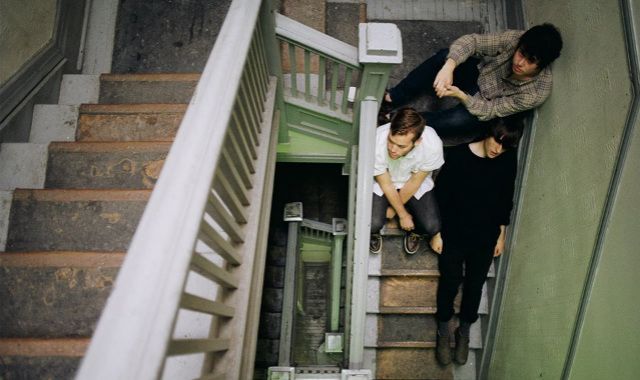For any up-and-coming band, the first festival performance is a big deal—it solidifies their role in the music world and confirms that the effort they put into their music is worth it. This experience was no different for Montreal-based band Seoul, who cheerfully reiterated during their performance that playing at Osheaga was their first “big gig.” Seoul is one of many up-and-coming bands that Osheaga was originally created to host, allowing local artists to garner more attention. This type of exposure marks a welcome shift into maturity and visibility for a band that once prided itself on anonymity.
Seoul, comprised of Julian Flavin, Dexter Garcia, and Nigel Ward, has been together for five years. In 2011 the group completed their first album, I Become Shade, but decided to put off releasing the record until 2015. “
It took a while to release it because we wanted to find a label that we were happy with,” Garcia said. “We were in different places, different cities, and we had other goals than just releasing the album.”
As a result, the album sat unchanged for nearly four years, despite misconceptions that the album was in fact being worked on throughout those years.
“[Saying the album took so many years to create] makes it seem like this strange epic masterpiece, which it’s not,” Garcia reiterated. “There was this period of serious effort followed by a period of waiting.”
It’s an understandable misconception, but one that the group says is farlry typical of other artists, just to a lesser degree.
“People have made a lot out of the taking-a-while thing,” Flavin added. “I feel like really it was just a process that takes a while period, and everybody has that to a degree that isn’t immediately given to the public eye.”
While the long period in between production and release didn’t much affect the sound of the band, it did give the group a chance to define their image. Seoul is unique in the sense that they didn’t come up with a name prior to the release of their album.
“Everything sort of stemmed from the aesthetic of the album,” Ward explained.
For the band’s first press photos, the images were in black and white and the groups faces were always distorted in some way. Combined with their relatively unknown status, the group was to tailor its image into something unique for university groups, giving them a more seemingly experienced edge.
“We thought it was more appropriate that certain images of other things that are not the band,” Flavin said. “The idea of having press photos where we’re not extremely visual was just a product of our thoughts on this album[….] We’re not against portraying ourselves as the people that we are, we just thought it was more apt musically.”
The ironic result of the group’s efforts to label themselves as the music, and not the band, is the resulting uncertainty as to what type of music they actually produce.
“You kinda have to do it [define your sound], it’s kind of a bummer always,” Flavin said. “For this album we’ve decided on ambient pop just because the music was written with a sort of pop song grafty kind of outlook, which is just something we’re really drawn to.”
The band’s ultimate goal is, in essence, to chill. Make more music, play more shows, and hopefully get an album out soon. But for now the band is happy to be recognized as a Quebec-based up-and-comer, even if they have been around for years.
“New is defined by when people start to realize that you’ve made music,” Ward said.









